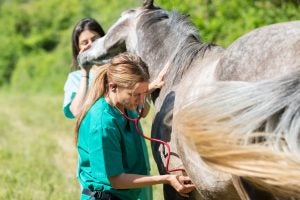Interstate movement of livestock is regulated by individual states receiving livestock. And, when it comes to horses, a Certificate of Veterinary Inspection and a Coggins test is required for travel between most states. Last month, a horse in Colorado was tested for Equine Infectious Anemia and subsequently euthanized after a positive test due to illegal movement across state lines into a neighboring state without health papers and a current Coggins test.
The Colorado Department of Agriculture’s State Veterinarians Office was notified on March 28, 2023 that a horse residing in Garfield County had tested presumptive positive for Equine Infectious Anemia. The initial test was completed at Colorado State University’s Western Slope Veterinary Diagnostic Laboratory with the confirmatory test completed at the National Veterinary Services Laboratory in Ames, Iowa, on April 4, 2023.
The positive horse was euthanized on April 11, 2023 and the exposed horses are currently under quarantine at the premises in Garfield County. The cohort horses will remain under quarantine until a second round of testing is completed in 60 days. The State Veterinarian’s Office is working on contact tracing as a result of these movements.
“The risk to the general equine population in Colorado is low at this time. However, this disease occurrence highlights the importance of disease prevention practices, such as routine testing for EIA as well as not sharing needles, syringes, tack, and equipment during meets or shows,” said State Veterinarian, Dr. Maggie Baldwin.
A negative EIA test (commonly called a Coggins test) and a Certificate of Veterinary Inspection (a signed health certificate) is required for horses to cross state lines in the United States. It is also recommended that all equestrian shows, rodeos, fairs, and other equine events consider requiring a negative Coggins for entry, even if the horses haven’t crossed state lines. Coggins tests are also recommended as an important component of a pre-purchase exam.
»Related: 10 weird livestock diseases, syndromes, and what to look for

Equine infection anemia
Equine Infectious Anemia is a viral disease spread by large biting insects (such as horse flies and deer flies) or inappropriate use of needles or other equipment used between susceptible equine animals such as horses, mules, and donkeys. Infected horses may not appear to have any clinical signs of the disease, although in some animals it can cause high fever, weakness, weight loss, an enlarged spleen, anemia, weak pulse, and even death. Horses must be tested annually for EIA before they can be transported across state lines.
There is no cure for EIA, so infected animals must be quarantined for life or euthanized. EIA is not transmissible to people.
Biosecurity tips for horse owners
- Don’t commingle your horse with other, unfamiliar horses.
- Do not share surgical or dental equipment contaminated with blood or debris between horses.
- Keep the area in and around your barn clean and dry to reduce the insect population.
- Apply fly sprays and insect repellents as needed.
- Work with your veterinarian to test your horses annually for EIA.
- Any symptomatic horses should be separated and the owner should contact their veterinarian immediately.
- EIA is a reportable disease and positive tests must be reported to your state veterinarian’s office.
»Related: Biosecurity in animal ag: Social distancing before it was cool


